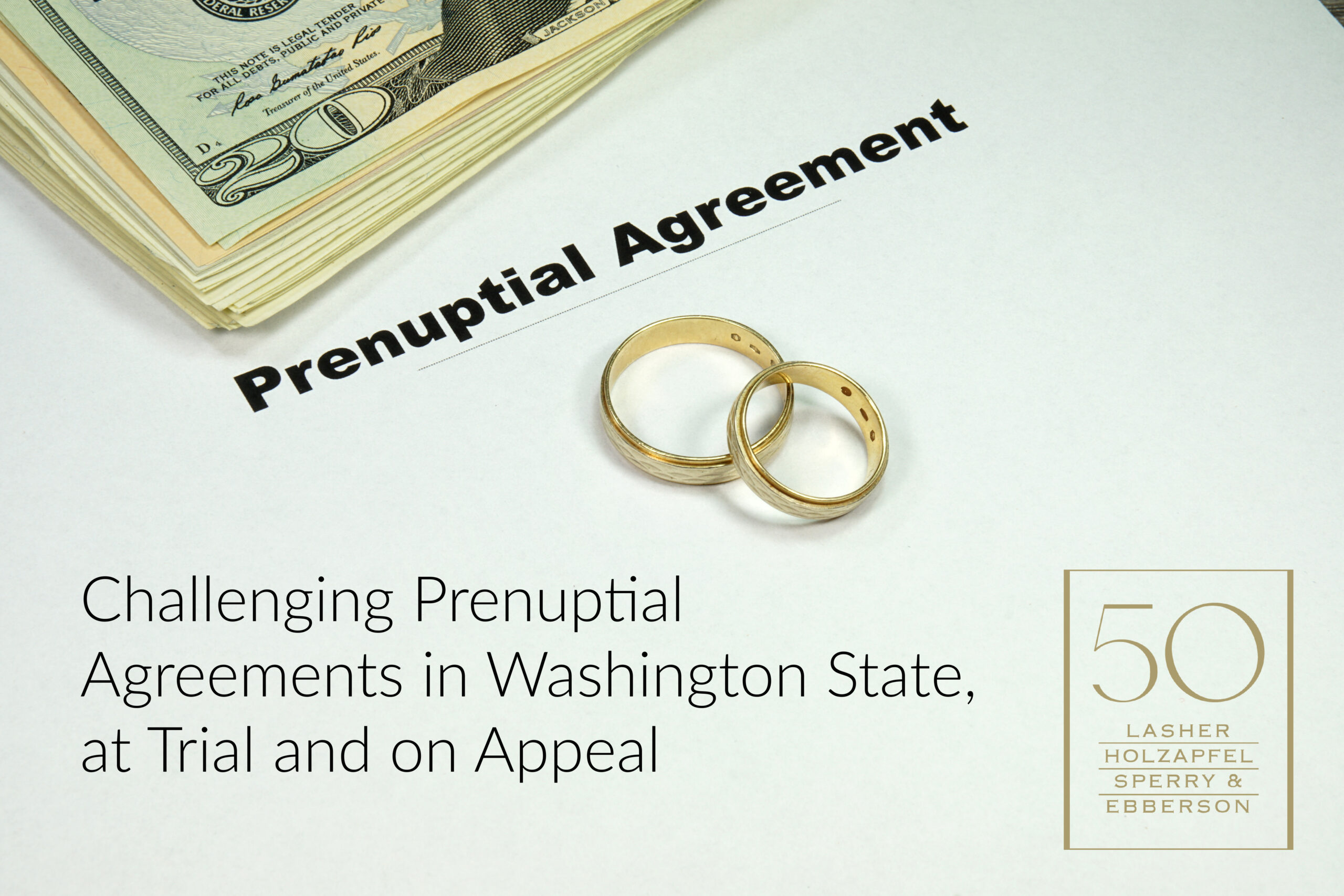Challenging Prenuptial Agreements in Washington State, at Trial and on Appeal

Posted on December 12, 2023 by Will Reingold
Most people are aware of the statistic that roughly 50% of marriages end in divorce; but did you know that only 5 – 10% of couples opt for a prenuptial agreement prior to marriage?
So, what does a prenuptial agreement entail? Broadly, prenups are agreements between two individuals who plan to marry one another, the point being to establish obligations during the marriage, as well as how assets and debts will be dealt with in the event of divorce or the death of one spouse. The Washington Supreme Court has long held that public policy favors prenuptial agreements because they are “generally regarded as conducive to marital tranquility and the avoidance of disputes about property in the future.”[1]
Yet there is something of a stigma associated with prenups. Obviously, there is the awkwardness of asking a future spouse to agree to a prenup in the first place. The person who is not seeking a prenup is likewise placed in a position that might be uncertain and uncomfortable—you can easily imagine one thinking: Why do they want a prenup? Do they think the marriage isn’t going to last? If I sign this prenup and we get divorced, what happens to me? Is this fair? Will we still get married if I don’t sign?
To be clear, many marriages with prenuptial agreements do not end in divorce. We just don’t generally hear about them because, well, there’s no story there. (This is akin to how we hear about a shark attack every so often, but we never get a story about the other thousands of surfers who simply go about their day.) But for some people who sign a prenup and later divorce, one spouse might be inclined to challenge whether it is a binding and enforceable agreement. There is a mountain of case law and factual disputes that goes into prenup challenges. Here are just a few things that you need to know if you are considering entering into a prenup:
- Prenuptial Agreements are Contracts
One bedrock principle underlying any prenup analysis is that these are contracts “subject to the principles of contract law.”[2] Contract law is, on the whole, a set of plans for how individuals might go about creating legal obligations for themselves, obligations that they specially tailor to suit their own particular needs.[3] That’s a fancy way of saying that two competent people—spouses or otherwise—can form valid and binding agreements with one another. With regard to prenups, Washington courts allow for prenups to address questions of assets and property, but prenups “generally cannot affect the rights of the parties’ children.”[4]
A court reviewing a prenuptial agreement to determine whether it is valid and enforceable will be tasked with assessing whether it was fairly reached by the contracting spouses. Judicial construction of a prenuptial agreement is a process which includes an examination of the immediate context and the legal policies which are applicable to the situation.[5] All this to say that you will have to make arguments grounded in contract law more so than in family law under these circumstances. This includes the basic requirement that there was “a meeting of the minds on the essential terms.”[6] And, like contract law, there is the possibility that the prenuptial agreement was made orally between the prospective spouses rather than written down; however, that kind of analysis is a whole other can of worms outside the scope of this blog article.[7]
- It’s All About Fairness
There are two kinds of fairness that underpin prenuptial agreement analyses: (1) substantive fairness, and (2) procedural fairness. For a prenup to be declared valid and enforceable by a Court in Washington, there must be a finding that it is either substantively or procedurally fair; in other words, the Court does not need to find that they are both fair. In Washington, these two fairness “prongs” are examined sequentially: “If the agreement makes a fair and reasonable provision for the spouse not seeking its enforcement, the analysis ends; the agreement is enforceable.”[8]
But, if the spouse challenging the prenup shows that the agreement is substantively unfair, “the court proceeds to the second prong” where the judge “determines whether the agreement is procedurally fair by asking two questions: (1) whether the spouses made a full disclosure of the amount, character, and value of the property involved and (2) whether the agreement was freely entered into on independent advice from counsel with full knowledge by both spouses of their rights.”[9] A prenup deemed procedurally fair will cure any substantive unfairness, whereas a finding that the prenup is both procedurally and substantively unfair means that it “is void from the inception.”[10]
- Appealing a Decision
Depending on how the trial judge rules on upholding the prenup, one of the spouses may understandably not be happy with the decision. An appeal is an option to challenge the trial court’s ruling. This is a big undertaking that calls for understanding how the appellate court—as opposed to the trial court—will review the prenuptial agreement. In a previous blog post, I’ve discussed the standards of review that the Court of Appeals will use to scrutinize a trial judge’s family law ruling, and how that will impact one’s chances of success on appeal.
In the context of a prenuptial agreement analysis, the first prong dealing with substantive fairness is “entirely a question of law unless there are factual disputes that must be resolved in order for a court to interpret the meaning of the contract” and the second prong dealing with procedural fairness is reviewed “de novo but undertaken in light of the trial court’s resolution of the facts.”[11] Note also that the Court of Appeals may, however, skip the analysis of substantive fairness if it concludes that it is procedurally fair.[12]
Any appellate argument will call for your attorney to analogize your case to existing precedent. A family law attorney at Lasher Holzapfel Sperry & Ebberson can help you navigate these often complex, fact-specific cases.
[1] Friedlander v. Friedlander, 80 Wn.2d 293, 301 (1972).
[2] In re Marriage of Obaidi and Qayoum, 154 Wn. App. 609, 616 (Div. III, 2010).
[3] Curtis Bridgeman, Contracts as Plans, U. Ill. Rev. 344 (2009).
[4] In re Marriage of Burke, 96 Wn. App. 474, 477 (Div. III, 1999).
[5] In re Marriage of Foran, 67 Wn. App. 242, 251 n.9 (Div. I, 1992).
[6] Obaidi and Qayoum, 154 Wn. App. at 616.
[7] DewBerry v. George, 115 Wn. App. 351 (Div. I, 2003).
[8] In re Marriage of Bernard, 165 Wn.2d 895, 902 (2009).
[9] Id. at 902–03.
[10] Kellar v. Estate of Kellar, 172 Wn. App. 562, 585 (Div. I, 2012).
[11] Bernard, 165 Wn.2d at 903.
[12] Kellar, 172 Wn. App. at 586.

